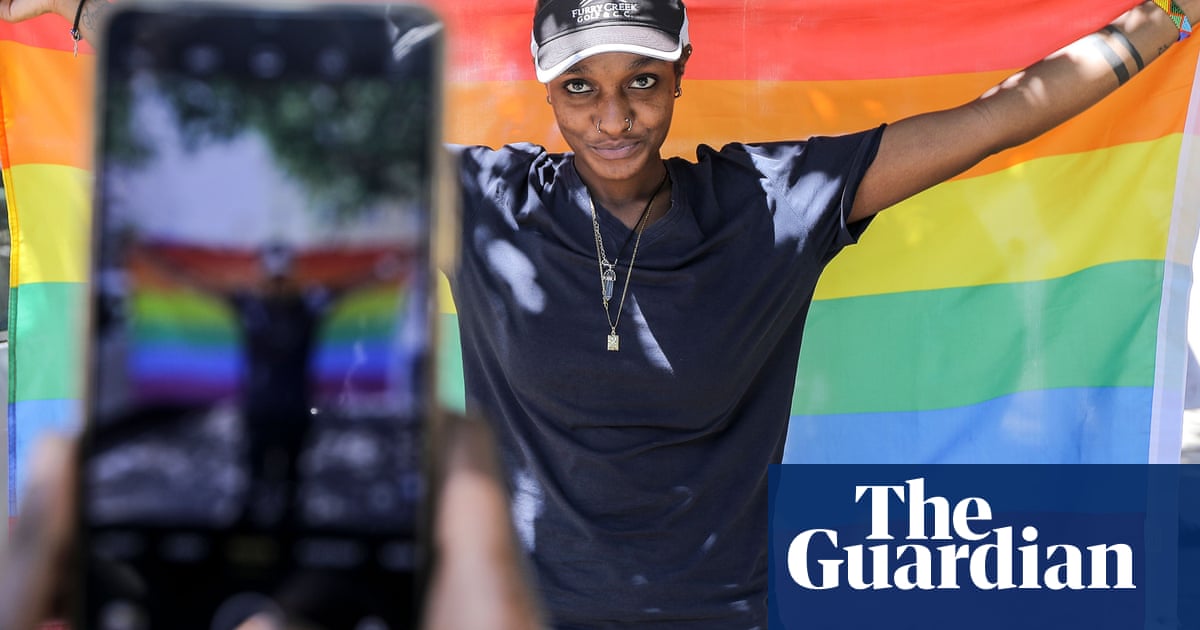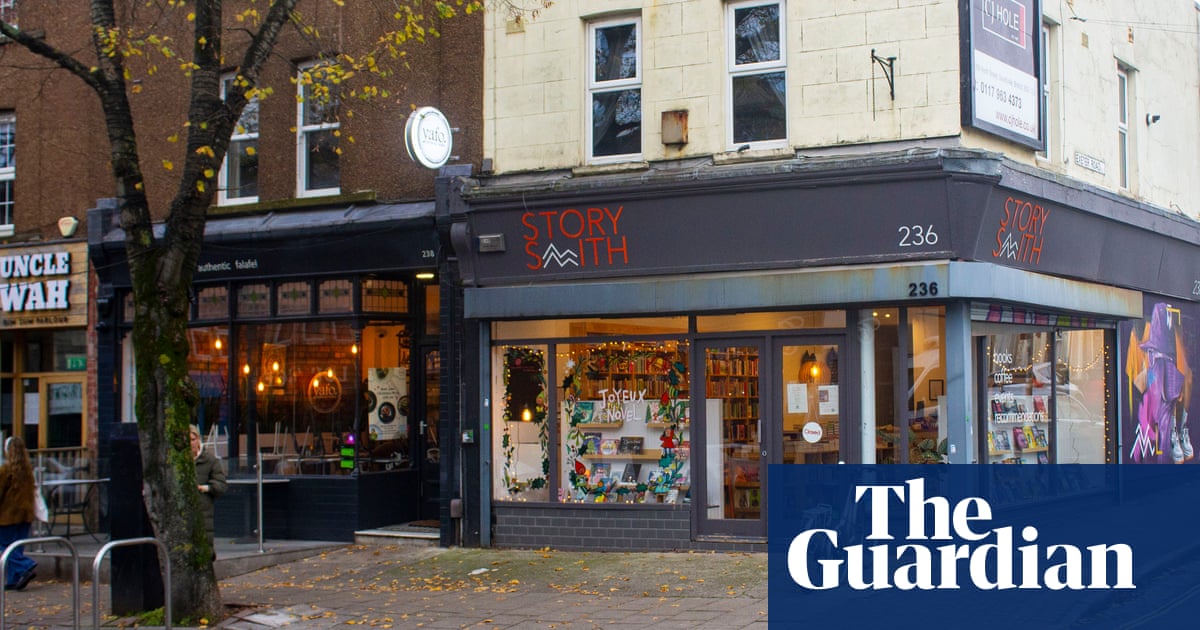Nineteen-year-old Naama Levy became an indelible symbol of Hamas’s 7 October 2023 attack on Israel. In footage from that day, an armed man dragged the barefoot and bleeding soldier out of the back of a Jeep on to a street in Gaza. Her arms were tied behind her back and blood pooled in the seat of her pajamas. Onlookers cheered at her distress.
For months, the women of Levy’s all-female surveillance unit – tatzpitaniyot – had noticed unusual practice raids and drills taking place on the other side of the fence, but their reports and warnings were ignored by commanders. Fifteen women from the unit were killed when Hamas fighters stormed their base on the Gaza border, and seven taken hostage.
Now, not just Levy’s abduction, but her redemption, will go down in Israeli history. On Saturday, 15 months after their ordeal began, her family and those of three other women from the unit sobbed with relief as they embraced their daughters, freed during the second week of a fragile ceasefire and hostage release deal.
“I was amazed by their mental strength. Strong women who survived days of hell and the light in their eyes did not go out,” the hospital director said.
When the Israeli news showed the four soldiers reuniting with their families on Saturday afternoon, Hostages Square in central Tel Aviv erupted, the crowd clapping, cheering and hugging each other.
“It’s an incredible moment, I am so happy,” said Gali Cohen, 28, a member of a group of about 1,000 former and serving tatzpitaniyot, or “spotters”, who came together to support the women’s families and campaign for a hostage release deal.
“They could have been any one of us, that’s why we feel this so deeply. It is bittersweet because now we have to keep fighting for the others,” she added.
In a show of force, Hamas dressed the four soldiers in khaki uniforms for a highly choreographed ceremony on a stage in a square in central Gaza City. The women were surrounded by elite Nukhba fighters, and cheering crowds throwing confetti, before they were handed over to the Red Cross.
“I don’t like the way [the handover] was done, but after 7 October, nothing surprises me anymore,” said Ella, 52, from Holon, near Tel Aviv. “I just want to hug those girls. Look at them, smiling, waving, after everything … How badass,” she added.
A total of 200 Palestinians held in Israel jails were freed in exchange for the four women on Saturday afternoon. In the West Bank city of Ramallah, 114 men - all thin, with shaved heads, and wearing grey prison uniforms - were received by enthusiastic crowds. Sixteen more were released to Khan Younis, in the south of the Gaza Strip, and another 70 people serving life sentences for violent crimes were driven to Egypt, where they will be deported to third countries.
Last Sunday, the world celebrated as the long-awaited ceasefire and hostage release deal got underway. Three smiling, apparently healthy civilian women came home to a country overjoyed at their return. Ninety Palestinian women and children held in Israeli jails were released to cheering crowds in Ramallah later the same night, and Gaza’s besieged population went to sleep for the first time in more than a year without the sound of drones or bombing overhead.
The ceasefire was a long time in the making. Over the past year Netanyahu was repeatedly accused of scuppering internationally mediated talks. He was believed to fear that concessions to Hamas would collapse his government, making the long-time leader more vulnerable to corruption charges.
Many hostage families are still grappling with the fact their loved ones, not among the 33 scheduled for release, are still in danger, or perhaps dead, giving Saturday’s gathering at Hostages Square a sad undertone.
Inbar Goldstein, 37, lost her brother, Nadav, 48, and 20-year-old niece Yam, in the Hamas attack. Her sister-in-law Chen Almog-Goldstein, niece Agam, 18, and nephews Gal, 12, and Tal, 10, were kidnapped and released during the previous ceasefire in November 2023, which collapsed after a week.
“My family can’t be brought back, but we must keep fighting. That is my job now,” she said, sitting on the steps in the square and stroking a dog wrapped in the Israeli flag.
Goldstein said she felt it was her duty to keep up the pressure on the government to keep the deal on track, amid widespread speculation Israel plans to resume the fighting in Gaza after a third of approximately 100 remaining hostages come home during the first stage of the ceasefire.
“We lost a lot, but have a lot to keep fighting for. We can’t let the government sabotage it,” she said.
after newsletter promotion
On Friday, the truce had appeared to falter, after Hamas released the names of the soldiers it would free – Levy, along with Liri Albag, 19, Karina Ariev, 20, and Daniella Gilboa, 20. German-Israeli citizen Arbel Yehud, 29, believed to be the last living female civilian hostage in Gaza, had been slated for this weekend’s release.
Yehud’s brother Dolev was killed in the 7 October attack on their homes in kibbutz Nir Oz, and her partner, Ariel Cunio, is also still a hostage, who should be released in the second stage of the deal in March.
Israeli officials said the delay breached the ceasefire agreement, and is now pushing for Yehud to be released before next Saturday. Until she is freed, displaced Palestinians in Gaza, desperate to return home, will not be allowed to travel north of the Netzarim Corridor that Israel has built to bisect the strip.
Travel through Netzarim was supposed to be possible from Sunday; it was not immediately clear if news of the delay had filtered through to people in Gaza, where electricity and phone signal are often in short supply.
Several reports emerged on Saturday that people who had tried to approach the coastal road through Netzarim were shot at; there was no immediate confirmation of casualties, but similar scenes played out in the southern city of Rafah this week, where Israeli forces are still stationed on the Gaza-Egypt border.
There is still much that can go wrong. Hamas warned later on Saturday that Israel preventing displaced civilians from returning to the north of Gaza could have “repercussions” for the subsequent stages of the agreement.
In the meantime, for the Israelis gathered in Hostages Square, the wait for the other captives continues. Agam Berger, 20, is the last spotter held captive in Gaza; three women in their fifties from Holon, Berger’s hometown, said they did not know the family but had joined the protest movement in solidarity.
“We all have daughters the same age serving in the military,” said Alona, 51. “We will show up to any action, whatever her family wants.”
Goldstein, whose family were killed in kibbutz Kfar Aza, said she was trying to appreciate the rare moment of joy. “What I’ve learned in the last year is that happiness and sadness don’t cancel each other out. They co-exist,” she said.
“Today, at least, there is more to be happy about than sad.”

.png) 3 months ago
40
3 months ago
40













































